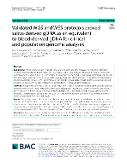| dc.contributor.author | Kvapilová, Kateřina | |
| dc.contributor.author | Mišenko, Pavol | |
| dc.contributor.author | Radvánszky, Ján | |
| dc.contributor.author | Brzoň, Ondřej | |
| dc.contributor.author | Budiš, Jaroslav | |
| dc.contributor.author | Gazdarica, Juraj | |
| dc.contributor.author | Pös, Ondrej | |
| dc.contributor.author | Korabečná, Marie | |
| dc.contributor.author | Kašný, Martin | |
| dc.contributor.author | Szemes, Tomáš | |
| dc.contributor.author | Kvapil, Petr | |
| dc.contributor.author | Pačes, Jan | |
| dc.contributor.author | Kozmik, Zbyněk | |
| dc.date.accessioned | 2024-04-29T10:10:40Z | |
| dc.date.available | 2024-04-29T10:10:40Z | |
| dc.date.issued | 2024 | |
| dc.identifier.uri | https://hdl.handle.net/20.500.14178/2425 | |
| dc.description.abstract | Background: Whole exome sequencing (WES) and whole genome sequencing (WGS) have become standard methods in human clinical diagnostics as well as in population genomics (POPGEN). Blood-derived genomic DNA (gDNA) is routinely used in the clinical environment. Conversely, many POPGEN studies and commercial tests benefit from easy saliva sampling. Here, we evaluated the quality of variant call sets and the level of genotype concordance of single nucleotide variants (SNVs) and small insertions and deletions (indels) for WES and WGS using paired blood- and saliva-derived gDNA isolates employing genomic reference-based validated protocols.Methods: The genomic reference standard Coriell NA12878 was repeatedly analyzed using optimized WES and WGS protocols, and data calls were compared with the truth dataset published by the Genome in a Bottle Consortium. gDNA was extracted from the paired blood and saliva samples of 10 participants and processed using the same protocols. A comparison of paired blood-saliva call sets was performed in the context of WGS and WES genomic reference-based technical validation results.Results: The quality pattern of called variants obtained from genomic-reference-based technical replicates correlates with data calls of paired blood-saliva-derived samples in all levels of tested examinations despite a higher rate of non-human contamination found in the saliva samples. The F1 score of 10 blood-to-saliva-derived comparisons ranged between 0.8030-0.9998 for SNVs and between 0.8883-0.9991 for small-indels in the case of the WGS protocol, and between 0.8643-0.999 for SNVs and between 0.7781-1.000 for small-indels in the case of the WES protocol.Conclusion: Saliva may be considered an equivalent material to blood for genetic analysis for both WGS and WES under strict protocol conditions. The accuracy of sequencing metrics and variant-detection accuracy is not affected by choosing saliva as the gDNA source instead of blood but much more significantly by the genomic context, variant types, and the sequencing technology used. | en |
| dc.language.iso | en | |
| dc.relation.url | https://doi.org/10.1186/s12864-024-10080-0 | |
| dc.rights | Creative Commons Uveďte původ 4.0 International | cs |
| dc.rights | Creative Commons Attribution 4.0 International | en |
| dc.title | Validated WGS and WES protocols proved saliva-derived gDNA as an equivalent to blood-derived gDNA for clinical and population genomic analyses | en |
| dcterms.accessRights | openAccess | |
| dcterms.license | https://creativecommons.org/licenses/by/4.0/legalcode | |
| dc.date.updated | 2024-04-29T10:10:40Z | |
| dc.subject.keyword | genomics variant analysis | en |
| dc.subject.keyword | saliva-derived gDNA | en |
| dc.subject.keyword | whole genome sequencing | en |
| dc.subject.keyword | whole exome sequencing | en |
| dc.subject.keyword | validation guideline | en |
| dc.identifier.eissn | 1471-2164 | |
| dc.relation.fundingReference | info:eu-repo/grantAgreement/MV0/VJ/VJ01010123 | |
| dc.relation.fundingReference | info:eu-repo/grantAgreement/UK/COOP/COOP | |
| dc.date.embargoStartDate | 2024-04-29 | |
| dc.type.obd | 73 | |
| dc.type.version | info:eu-repo/semantics/publishedVersion | |
| dc.identifier.doi | 10.1186/s12864-024-10080-0 | |
| dc.identifier.utWos | 001163637100001 | |
| dc.identifier.eidScopus | 2-s2.0-85185401063 | |
| dc.identifier.obd | 646702 | |
| dc.identifier.pubmed | 38365587 | |
| dc.subject.rivPrimary | 10000::10600::10606 | |
| dcterms.isPartOf.name | BMC Genomics | |
| dcterms.isPartOf.issn | 1471-2164 | |
| dcterms.isPartOf.journalYear | 2024 | |
| dcterms.isPartOf.journalVolume | 25 | |
| dcterms.isPartOf.journalIssue | 1 | |
| uk.faculty.primaryId | 115 | |
| uk.faculty.primaryName | Přírodovědecká fakulta | cs |
| uk.faculty.primaryName | Faculty of Science | en |
| uk.faculty.secondaryId | 108 | |
| uk.faculty.secondaryName | 1. lékařská fakulta | cs |
| uk.faculty.secondaryName | First Faculty of Medicine | en |
| uk.department.primaryId | 1034 | |
| uk.department.primaryName | Katedra genetiky a mikrobiologie | cs |
| uk.department.primaryName | Department of Genetics and Microbiology | en |
| uk.department.secondaryId | 1535 | |
| uk.department.secondaryName | Ústav biologie a lékařské genetiky 1. LF UK a VFN | cs |
| uk.department.secondaryName | Institute of Biology and Medical Genetics | en |
| dc.type.obdHierarchyCs | ČLÁNEK V ČASOPISU::článek v časopisu::původní článek | cs |
| dc.type.obdHierarchyEn | JOURNAL ARTICLE::journal article::original article | en |
| dc.type.obdHierarchyCode | 73::152::206 | en |
| uk.displayTitle | Validated WGS and WES protocols proved saliva-derived gDNA as an equivalent to blood-derived gDNA for clinical and population genomic analyses | en |

